The Best Time to Go to Santorini: Weather Guide and What to Expect
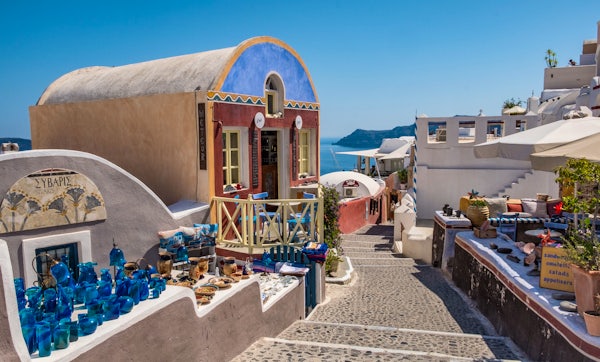
Santorini’s stunning views and landscapes make it a must-visit for all kinds of travellers. Whether you're heading there for a romantic getaway, a family vacation, or passing through on one of our Greek Island Explorer Tours, the type of weather you want depends on what you’re there for! In this guide, we’ll break down everything you need to know about Santorini’s weather, so you can plan your trip just the way you like it.
Average Air Temperature in Santorini
Santorini enjoys a Mediterranean climate, characterised by hot, dry summers and mild, rainy winters. This region experiences over 300 days of sunshine annually, making it a popular year-round destination.
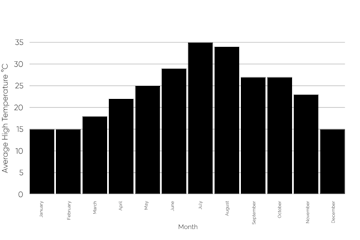
Summer Temperature
Summers in Santorini (June-August) are hot and dry, with temperatures averaging between 25°C to 35°C (77°F to 95°F). July and August are the hottest months, ideal for sunbathing and exploring the island's beaches.
Spring Temperature
Spring (March-May) brings pleasant weather, with temperatures ranging from 15°C to 25°C (59°F to 77°F). This season is perfect for hiking and exploring Santorini's vineyards in bloom.
Autumn Temperature
Autumn (September-November) offers mild temperatures, averaging between 20°C and 27°C (68°F to 81°F). It's an excellent time to visit for fewer crowds and enjoyable sightseeing.
Winter Temperature
Winters (December-February) are mild and occasionally rainy, with temperatures averaging 10°C to 15°C (50°F to 59°F). This season is ideal for travellers looking to experience Santorini's cultural attractions away from the peak tourist season.

Average Sea Temperature in Santorini
Santorini's sea temperature changes throughout the year, offering a range of conditions for beachgoers.
Summer Sea Temperature
The Aegean Sea warms to 25°C–27°C (77°F–81°F) from June to August, ideal for swimming and water activities.
Spring Sea Temperature
Sea temperatures range from 16°C to 21°C (61°F–70°F) from March to May, perfect for a refreshing dip during mild weather.
Autumn Sea Temperature
The water stays between 21°C and 24°C (70°F–75°F) from September to November, making it a great time for quieter beach visits.
Winter Sea Temperature
Sea temperatures drop to 16°C–18°C (61°F–64°F) from December to February, still mild enough for those looking for a peaceful off-season experience.

Best Time to Go to Santorini
The best time to go to Santorini largely depends on your preferences and travel plans.
Average Visitor Numbers Month On Month
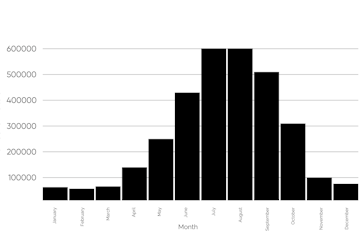
Peak Season
This is the busiest time to visit Santorini, with June seeing approximately 430,000 visitors, July at 610,000, and August reaching its peak at 650,000. During these months, you can expect hot weather and vibrant nightlife, with the bustling island coming alive. Advance bookings are essential if you want to secure accommodation, tours or restaurant bookings. Or, skip the planning altogether and join one of our 9 or 11-day Greek Islands Tours, offering the perfect combination of culture and party.

Shoulder Seasons
April to May and October to November are ideal times to visit if you’re after milder weather, fewer crowds and lower accommodation prices. During April, visitor numbers are around 140,000, and in May, approximately 250,000 people visit. In October, the number drops to about 310,000. It’s also a great opportunity to join one of our 8-day Greek Island Explorer Tours, which are tailored to take full advantage of the mild weather and fewer crowds to enjoy the breathtaking landscapes that Greece is known for without interruption.

Off-Season
December to March is the off-season, perfect for budget travellers and those seeking a quieter experience. However, many restaurants and attractions may have reduced operating hours during this time, and some ferry and flight schedules are less frequent. While it's ideal for quieter exploration, it’s a good idea to plan ahead as some services may be limited.
Things to do in Santorini
Beach Activities
Santorini is also famed for its stunning black sand beaches, a unique feature created by volcanic eruptions that shape its striking landscapes. Kamari and Perissa are two of the island's most popular beaches, offering laid-back settings with beach bars and clubs where you can sip cocktails, often in exchange for a sun lounger. These beaches are perfect in the high season and shoulder season for a peaceful retreat away from the hustle of Fira, but they’re also ideal during the off-season, offering cooler coastal walks.
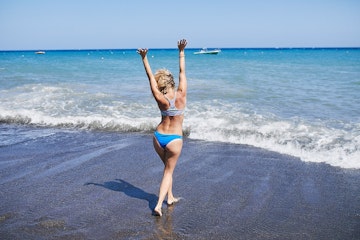
Outdoor Exploration
Spring and autumn are the perfect seasons for outdoor activities in Santorini, offering mild weather and fewer crowds. One of the most popular hikes is the scenic route from Oia to Fira, featured in our Greek Island Explorer itinerary, where you can enjoy panoramic views of the island's rugged coastline, caldera, and the Aegean Sea. Along the way, you'll pass through picturesque villages, ancient sites, and hidden churches, adding a cultural layer to the natural beauty surrounding you.
Hiking in Greece is a unique experience because the trails are often dotted with ancient monuments, old chapels, and ruins, which make every step of the journey feel like a walk through history. Whether you're hiking through the vineyards or along the cliffs, the landscape offers stunning vistas at every turn.
While hiking is popular during the high season, spring and autumn offer the ideal conditions, with cooler temperatures and fewer tourists. These seasons are perfect for enjoying quieter walks along the coast, or for exploring the ancient ruins of Akrotiri, where the rich history of the island adds depth to your outdoor adventure.
Winery Tours
Santorini’s volcanic soil and Mediterranean climate make it perfect for growing unique wines. The island is famous for its Assyrtiko grape, which produces crisp, mineral wines with a fresh citrus kick. Spring is a great time to visit wineries, with the vineyards full of lush, green vines. In autumn, it’s harvest season, and you can even join in on the grape picking and learn about how the island’s wines are made. Wineries usually offer tours of their cellars, where you can get a behind-the-scenes look at the winemaking process, from old traditions to modern techniques. Along with Assyrtiko, you’ll also find other local grapes like Athiri and Aidani, which add their own twist to the wines.

Budget Considerations for Visiting Santorini
Santorini is renowned for its stunning views and luxurious accommodation, but budget-conscious travellers can still enjoy the island by planning wisely.
Accommodation Prices
From budget hostels to charming Airbnb’s, mid-range hotels, and luxury villas, Santorini offers something for every kind of traveller. Prices will vary depending on when you visit, with the lowest rates typically found during the shoulder season (April to May and October to November).
If you’re looking for the best value, travelling during the shoulder months is your best bet.
During the summer months (June to August), prices reach their peak, particularly for those with views of the caldera or the famous sunsets. It's all about timing your visit to get the best deal without compromising on the experience!
Flight Prices
Flights to Santorini are generally cheaper during the shoulder months (April to May and October to November), as demand increases during the peak summer season, driving flight prices higher. To save money, consider travelling during the shoulder season, avoiding school holidays, and booking your flights in advance. You could also look at flying into nearby airports like Athens and then taking a short connecting flight or ferry to Santorini, which can often be more affordable, especially if you're flexible with your travel dates and open to different travel options.

Wind Patterns in Santorini
Santorini experiences strong wind patterns, particularly in the summer months, with the "Meltemi" winds being the most notable. These winds, which typically blow from the north, are most prominent from late May to September, offering a cooling breeze to the island but sometimes causing rough seas and stronger gusts. The Meltemi winds can be particularly noticeable in the afternoon, making it a great time to seek shelter in the island's quieter corners or enjoy a more relaxed pace. During the shoulder months of spring and autumn, the winds are generally calmer, providing a more tranquil atmosphere for outdoor activities and sightseeing. It's always advisable to check local weather reports if you're planning on spending time by the sea or engaging in water sports.
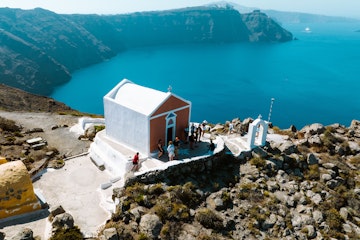
Packing for Santorini
Regardless of when you visit Santorini, consider packing the following essentials:
- Lightweight clothing and swimwear for the summer months
- Comfortable shoes for walking and hiking
- A light jacket or sweater for cooler evenings, especially in spring and autumn
- Sunscreen, sunglasses, and a hat to protect against the strong Mediterranean sun
Understanding Santorini's weather patterns allows you to plan a memorable and enjoyable trip to this iconic destination. Whether you prefer the vibrant energy of summer or the calm of winter, Santorini offers something for every traveller throughout the year.
Plan ahead, pack wisely, and get ready to immerse yourself in the beauty of Santorini, no matter the season. Dive into our ultimate Guide to Santorini for more information to make the most of your time on this world-famous island.

